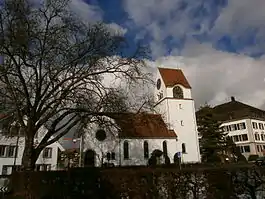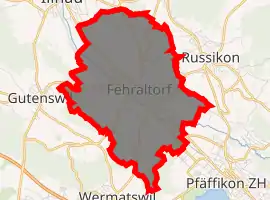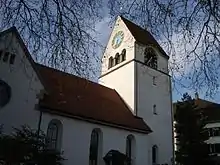Fehraltorf
Fehraltorf is a municipality in the district of Pfäffikon in the canton of Zürich in Switzerland.
Fehraltorf | |
|---|---|
 | |
 Coat of arms | |
Location of Fehraltorf 
| |
 Fehraltorf  Fehraltorf | |
| Coordinates: 47°23′N 8°45′E | |
| Country | Switzerland |
| Canton | Zurich |
| District | Pfäffikon |
| Area | |
| • Total | 9.48 km2 (3.66 sq mi) |
| Elevation | 530 m (1,740 ft) |
| Population (2018-12-31)[2] | |
| • Total | 6,434 |
| • Density | 680/km2 (1,800/sq mi) |
| Time zone | UTC+01:00 (Central European Time) |
| • Summer (DST) | UTC+02:00 (Central European Summer Time) |
| Postal code(s) | 8320 |
| SFOS number | 0172 |
| Surrounded by | Illnau-Effretikon, Pfäffikon, Russikon, Uster, Volketswil |
| Website | www SFSO statistics |
History
Fehraltorf is first mentioned between 1265-87 as Rueggesaltorf and also as Altorf de Chiburg. Around 1670 it was mentioned as Rüeggis-Altdorff and as Feer-Altdorff.[3]
Geography

Fehraltorf has an area of 9.5 km2 (3.7 sq mi). Of this area, 55.8% is used for agricultural purposes, while 27.3% is forested. Of the rest of the land, 15.9% is settled (buildings or roads) and the remainder (1.1%) is non-productive (rivers, glaciers or mountains).[4] In 1996 housing and buildings made up 10.3% of the total area, while transportation infrastructure made up the rest (5.6%).[5] Of the total unproductive area, water (streams and lakes) made up 0.7% of the area. As of 2007 13.6% of the total municipal area was undergoing some type of construction.[5]
It is located in the upper Kempt valley and includes the village of Fehraltorf and a portion of the hamlet of Mesikon.
Demographics

Fehraltorf has a population (as of 31 December 2019) of 6,485.[6] As of 2007, 15.2% of the population was made up of foreign nationals. As of 2008 the gender distribution of the population was 49.6% male and 50.4% female. Over the last 10 years the population has grown at a rate of 15.1%. Most of the population (as of 2000) speaks German (88.6%), with Italian being second most common ( 2.6%) and Albanian being third ( 1.9%).
In the 2007 election the most popular party was the SVP which received 39.6% of the vote. The next three most popular parties were the SPS (15.2%), the FDP (14.2%) and the CSP (10.2%).
The age distribution of the population (as of 2000) is children and teenagers (0–19 years old) make up 26.1% of the population, while adults (20–64 years old) make up 66.3% and seniors (over 64 years old) make up 7.7%. The entire Swiss population is generally well educated. In Fehraltorf about 79.9% of the population (between age 25-64) have completed either non-mandatory upper secondary education or additional higher education (either university or a Fachhochschule). There are 1916 households in Fehraltorf.[5]
Fehraltorf has an unemployment rate of 2.58%. As of 2005, there were 153 people employed in the primary economic sector and about 31 businesses involved in this sector. 884 people are employed in the secondary sector and there are 78 businesses in this sector. 1472 people are employed in the tertiary sector, with 192 businesses in this sector.[4] As of 2007 71.8% of the working population were employed full-time, and 28.2% were employed part-time.[5]
As of 2008 there were 1433 Catholics and 2414 Protestants in Fehraltorf. In the 2000 census, religion was broken down into several smaller categories. From the census, 50.1% were some type of Protestant, with 47.2% belonging to the Swiss Reformed Church and 2.8% belonging to other Protestant churches. 29.4% of the population were Catholic. Of the rest of the population, 0% were Muslim, 5.2% belonged to another religion (not listed), 2.8% did not give a religion, and 11.8% were atheist or agnostic.[5]
The historical population is given in the following table:[3]
| year | population |
|---|---|
| 1467 | c. 190 |
| 1634 | 341 |
| 1733 | 800 |
| 1850 | 1,014 |
| 1860 | 1,081 |
| 1900 | 938 |
| 1910 | 910 |
| 1950 | 1,136 |
| 1980 | 2,486 |
| 2000 | 4,687 |
Transportation
Fehraltorf railway station is a stop of the S-Bahn Zürich on the line S3. The Speck-Fehraltorf Airfield (ICAO Code LSZK) south of town offers a 600m grass runway.
References
- "Arealstatistik Standard - Gemeinden nach 4 Hauptbereichen". Federal Statistical Office. Retrieved 13 January 2019.
- "Ständige Wohnbevölkerung nach Staatsangehörigkeitskategorie Geschlecht und Gemeinde; Provisorische Jahresergebnisse; 2018". Federal Statistical Office. 9 April 2019. Retrieved 11 April 2019.
- Fehraltorf in German, French and Italian in the online Historical Dictionary of Switzerland.
- Swiss Federal Statistical Office Archived January 5, 2016, at the Wayback Machine accessed 11-Aug-2009
- Statistics Zurich (in German) accessed 4 August 2009
- "Ständige und nichtständige Wohnbevölkerung nach institutionellen Gliederungen, Geburtsort und Staatsangehörigkeit". bfs.admin.ch (in German). Swiss Federal Statistical Office - STAT-TAB. 31 December 2019. Retrieved 6 October 2020.
External links
| Wikimedia Commons has media related to Fehraltorf. |
- Official website (in German)
- Fehraltorf in German, French and Italian in the online Historical Dictionary of Switzerland.